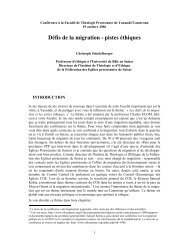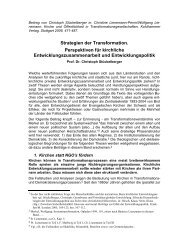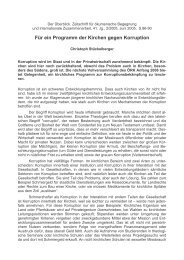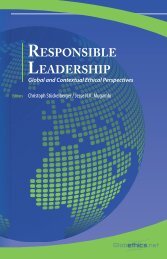BREAK THE CHAINS OF OPPRESION AND THE YOKE OF ...
BREAK THE CHAINS OF OPPRESION AND THE YOKE OF ...
BREAK THE CHAINS OF OPPRESION AND THE YOKE OF ...
Create successful ePaper yourself
Turn your PDF publications into a flip-book with our unique Google optimized e-Paper software.
Pov erty<br />
our doorstep as relatively poor, because with reference to the world as a whole<br />
any one who has less than $1 per day at her or his disposal counts as absolutely<br />
poor.<br />
The children in Germany are relatively poor.<br />
But this in itself is bitter: Their poverty is frequently not recognized as such.<br />
Here, however, the reasons for poverty are obvious. The most important causes:<br />
job problems such as (long-term) unemployment, low incomes, Hartz IV dependence,<br />
and social problems such as excessive debts, separation/divorce or<br />
handicap/illness. Of these it is above all immigrants, single parents and families<br />
with many children who are affected. Poor children have poor parents. And if<br />
nothing happens they remain poor.<br />
Relatively arm – these are children whose parents cannot afford lunch in the daynursery<br />
ofr in all-day schools; children who come to school in winter wearing sandals<br />
and thin coats; children who, in their shame, hide the fact that they cannot afford<br />
the class-outing nor private tuition; not to mention visits to the cinema, piano<br />
lessons, riding or ballet; children whose parents are so preoccupied with the<br />
daily battle and frustration that they no longer have any loving care left; children<br />
who are excluded from many of the usual things in our society; children who<br />
spend most of their free time in front of the television and are too overweight.<br />
Poverty denies these children their rightful place in our society. That is not only<br />
true for the present but also for the children’s prospects for their whole lives: The<br />
connection between poverty and educational success cannot be denied. At present<br />
it decides – and probably will to an even greater extent in the future – about<br />
sharing on equal �terms �in the economic, � social �and community � life in society.<br />
If nothing happens poor children remain captive in a vicious circle; no or only<br />
an inadequate educational qualification, no training, no job, no money, no<br />
prospects. Here one can only agree with the children: The grown-ups in church<br />
and society must do something!<br />
People who give poor children practical help and tackle their situation will at<br />
some point meet their own fears of impending poverty. Is one’s own family income<br />
sufficient to support one’s own children in a satisfactory way? How secure<br />
is one’s own job? Are provisions for old age and health insurance enough to<br />
guard against social relegation? The newspapers report that the middle class is<br />
crumbling. This raises fears even in our congregations and also among those who<br />
work in the church and social welfare organizations.<br />
This fear of social relegation is in the meantime almost omnipresent in our society.<br />
It prevents people from approaching the children affected in a respectful way<br />
and this hinders the necessary change in attitude.<br />
Engagement against child poverty demands that one tackles this fear. Where so-<br />
�������������������������������������<br />
� � � � � � � ����������������<br />
�<br />
– AGAINST CHILD POVERTY –<br />
197










